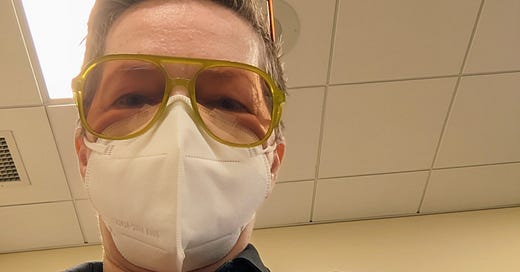Sitting in an overcrowded room under the glare of fluorescent lights for 9 hours was not my first choice for how to spend a sunny Thursday in May but, I hoped, having the face of Long COVID front and center - staring them down all day - had to make a difference. Had to move them. Had to make them understand how desperate we were for this legislation. How much it was needed.
The legislation in question was Maine’s LD1688, An Act to Encourage Continuing Education Relating to Certain Infection-associated Chronic Conditions for Physicians and Nurses. The bill asked - in the simplest of terms, with absolutely no consequences for declining and zero fiscal requirements to implement - medical providers to consider applying any of the dozens of hours of continuing medical education (CME) they must already take to any of a number of chronic conditions we know are at best misunderstood by providers and at worst completely unknown to some.
I had testified in favor of the bill, along with 22 of my fellow Mainers, the week before. It seemed likely to garner committee support as, compared to our 23 in favor, only one person had offered testimony against the bill. Now I was back at the capital for the committee’s working session where they would decide whether the bill should go on to be considered by the entire legislature.
Settled in - front row, center aisle - I looked each legislator in the eye every chance I got. I was there to be heard but if they refused to hear me, I could at least make sure I’d be seen. I was certainly noticeable; the only masked person in a room packed full of healthcare and insurance lobbyists.
The irony of this sight - a shoulder-to-shoulder room filled with maskless health industry professionals surrounding a single, immunocompromised masked patient - seemed lost on everyone but me, the only person apparently there to represent the recipients of health services.
Beyond the moving stories of years wasted on misdiagnoses, gaslighting, and other forms of medical malpractice provided in testimony the week before, were the hard facts about our conditions.
In the case of my own, here’s what we knew: Millions of lives lost. Trillions of dollars squandered. Thousands confined to their homes, if they are lucky enough to have retained their homes. And yet more than one-third of Americans have never heard of my condition, fewer than 10 percent of physicians say they’re confident diagnosing it, and fewer than 5 percent say they’re confident treating it.
To date, these numbers hadn’t seemed to matter but would I? A single person. The only one not there for a client paying me to lobby on their behalf or an organization paying me to speak for their members. The only one, it seemed, whose actual life was on the line.
Nope. No siree. I did not matter and neither, it seemed, did the lives of the hundreds of thousands I had hoped to honor with my presence in that room.1
One week earlier, 23 of us had shown up in some way, in most cases at great cost to our own health and well-being, to implore policy makers to see us, believe us, and hear our pleas for help. And, after spending months crafting the bill, securing sponsors and co-sponsors, rallying patient support, working earnestly to win provider trust and support, in the face of just one objection to the bill, the Committee on Health Coverage, Insurance and Financial Services voted - unanimously and without discussion - to reject the bill.
That’s it. End of story. No questions.
The Maine Medical Association, who testified neither for nor against the bill, has - much to my relief - agreed to work with me to create and distribute CME courses focused on Long COVID and other Infection-Associated Chronic Conditions moving forward. It is this promise that leaves me hopeful that we - providers and the public alike - might wake up to the reality that COVID is killing us before it’s too late. Time will tell.





Thank you for speaking out. COVID response is a massive public health failure, that led to no permanent changes in American society that could have transformed our lives for the better such as increased social safety nets, better air filtration quality standards, vaccine/mask mandates, universal health care, flexible work options, comprehensive paid leave time, in addition to more research funding to treat Long-covid,, pandemic planning, and improvements in medical communication and counselling.
I highly recommend reading "The Viral Underclass" by Steven Thrasher in which the author traces COVID responses to the HIV crises of the 1980s.
Thanks for speaking out, Amy. I am sorry it is so frustrating! However, you keep raising the issue so that people can't forget. Eventually, they will understand.